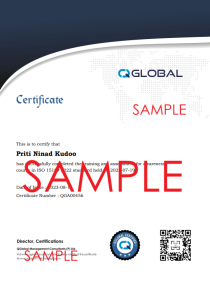NABH Standards for Allopathic Clinic 1st Edition - Awareness Course
- Description
- Curriculum

Foundations course on NABH accreditation standards for allopathic clinics teaches you the process approach, allopathic clinic quality management principles and the requirements and benefits of accreditation. The essential objective of this foundations course is to create awareness for participants regarding various basic requirements of the NABH accreditation standards for allopathic clinics & impart working knowledge on how these requirements can be interpreted to suit the organization’s processes, products, people & patients.
Who Should Attend?
- Anyone involved in the planning, implementing, maintaining, supervising or auditing of an allopathic clinic quality management system based on NABH accreditation standards for allopathic clinics
- Jobseekers interested in understanding the best allopathic clinic quality management practices
- Anyone employed in healthcare organizations and looking to gain skills and knowledge to improve their career performance
Key Benefits
- Understand the structure of NABH accreditation standards for allopathic clinics
- Learn importance and benefits of a allopathic clinic quality management system based on NABH accreditation standards for allopathic clinics
- Understand key requirements, terms and definitions of NABH accreditation standards for allopathic clinics
- Learn main concepts such as process approach, Plan-Do-Check-Act, and allopathic clinic quality management principles.
- Prepare yourself to participate in implementation process of allopathic clinic quality management system
- Manage quality and drive continual improvement
- Take steps to ensure that quality is at the heart of your organization
- Learn to meet and exceed patient requirements
- Learn about patient rights and responsibilities
- Learn techniques to create and manage documents and records relevant to allopathic clinic quality management system , critical to the services delivered and those required to meet patient and regulatory requirements
- Fill the gap in your professional knowledge
Learning & Evaluation Method
This is a live and interactive course. Once you purchase the course, our team will contact you to plan the training. No matter where you are located, we schedule the classes based on your convenience and time zone. You can plan to attend the training in sessions of 4 or 8 hr duration, based on how much time you can spend in a day.
Certification
There are increasing numbers of organizations, who prefer candidates those who have certain certifications from recognized programs. Certification demonstrates your commitment to superior professionalism, upholding industry standards, and continued learning. These merits can help boost your professional credibility and prestige within your own network, in your organisation, with your current clients, and when pursuing new business opportunities. After the successful completion of the course and final exam, you will be awarded with a certificate of completion issued by QGlobal. Your credentials will be made available in the global online directory and can be verified by anyone searching with the certificate number. Without doubt we can say that our training courses are well recognized and sought after by organizations across various geographies.
Buy for group Are you planning to buy this course for a group? We have the best prices for you! Select ‘Buy for Group’ option and add to the cart. You will get a discount of 60 – 75% for a group of up to 10 participants. To make a group purchase, create your group name and add individual emails of up to 10 participants. Each participant will get the access to the course materials, exam and the certificate. We will arrange one live-online session for the entire group.
Total: 206 Courses View all
-
1Introduction to standards and certification
- Purpose of standardization
- Benefits of certification
-
2Introduction to NABH standards
-
3Access, assessment and information (AAI)
-
4Care of patients (COP)
-
5Patient rights and education (PRE)
-
6Infection control (HIC)
-
7Patient safety and quality improvement (PSQ)
-
8Responsibilities of management (ROM)
-
9Facility management and safety (FMS)
-
10Community participation and integration (CPI)
















































